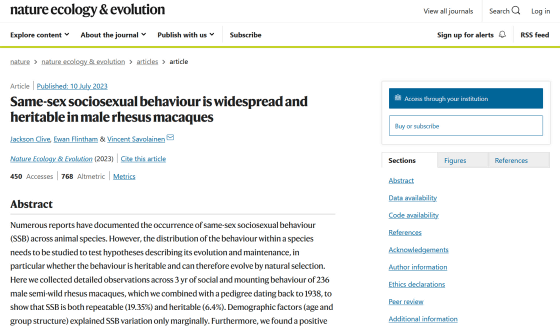Studies show that male monkeys have sex with more males than females, suggesting that homosexual behavior may have an evolutionary advantage

by Chloe Coxshall
In recent years, social understanding of homosexuality is being formed, but many people still have prejudice against homosexuality, and some countries have laws that punish homosexuals. Criticism of homosexuality has some saying that ``homosexuality is biologically strange,'' but a new study of wild rhesus
Same-sex sociosexual behavior is widespread and heritable in male rhesus macaques | Nature Ecology & Evolution
https://doi.org/10.1038/s41559-023-02111-y

Study shows same-sex behavior is widespread and heritable in macaque monkeys | Imperial News | Imperial College London
https://www.imperial.ac.uk/news/245895/study-shows-samesex-behaviour-widespread-heritable/
Sex between two males is extremely common in wild macaque monkeys | New Scientist
https://www.newscientist.com/article/2381784-sex-between-two-males-is-extremely-common-in-wild-macaque-monkeys/
Male monkeys on tiny island have way more sex with each other than females, scientists discover | Live Science
https://www.livescience.com/animals/monkeys/male-monkeys-on-tiny-island-have-way-more-sex-with-each-other-than-females-scientists-discover
Homosexual behavior has been observed in a variety of animals, from insects to penguins , and is by no means unique to humans. It has also been pointed out that homosexuality may have some evolutionary advantage , as homosexual behavior has been observed in a wide range of nature.
So Vincent Savolainen , professor of evolutionary biology at Imperial College London , and his team observed a colony of 1,700 rhesus monkeys on the island of Santiago, of which 236 were males. We analyzed their sexual behavior and pedigree. Rhesus monkeys on Santiago Island have been tracked as research subjects for many years, and there are records of DNA analysis for individuals since 1992.

In 2017, 2019, and 2020, we tracked the behavior of rhesus monkeys for 7 hours a day for a total of 72 days, and found that 72% of 236 monkeys mounted females, while 72% mounted other males. was only 46%. Because the research team observed the individual from a distance, it was not possible to confirm whether the male's penis actually entered the other's anus, but it was confirmed that some of the mounted males had sperm clogged in the anus. It seems that I was able to do it.
It is said that mounding is also done to show off superiority to the opponent, but about half of the mountings observed this time were done to males with higher ranks in the colony, and they are socially social. No correlation was found between position and mounting. ``The monkeys sometimes had an erection, and sometimes penetrated or ejaculated, so I think it's enough to say that mounting is sex, not a show of superiority,'' Savolainen said. said.
An analysis of male monkeys that engaged in homosexual behavior found that pairs of males who regularly engaged in homosexual behavior were more likely to cooperate with each other during conflicts within the colony. It was also found that males with homosexual behavior left more offspring, suggesting that homosexual behavior may have a reproductive advantage.
``We found the exact opposite of what people used to say: ``The more animals have sex with same-sex animals, the fewer babies will be born,'' said Savolainen. ``Sex strengthens bonds. And they will fight together against other males who don't have sex, and as a result, males will dominate the group, have sex with more females, and have more offspring. ' said.
Furthermore, analysis of pedigree data also showed that 6.4% of homosexual behavior in males was hereditary, with the remainder due to environmental factors such as age distribution. This is the first time that homosexual behavior in animals has been shown to be based on genes, suggesting that genes that cause homosexuality may have been selected through the process of natural selection. In the future, the research team plans to conduct more detailed genetic analysis to find out which genes lead to homosexual behavior.

'We share an ancestor with rhesus monkeys,' Savolainen said. 'This study suggests that homosexual behavior may have evolved evolutionarily in humans and may be beneficial, as seen in monkeys.' Of course there are differences between humans and these monkeys, but there may be commonalities.' It remains, and sadly some countries carry out the death penalty for homosexuality, and our research shows that homosexual behavior is widespread in non-human animals.'
Related Posts:







